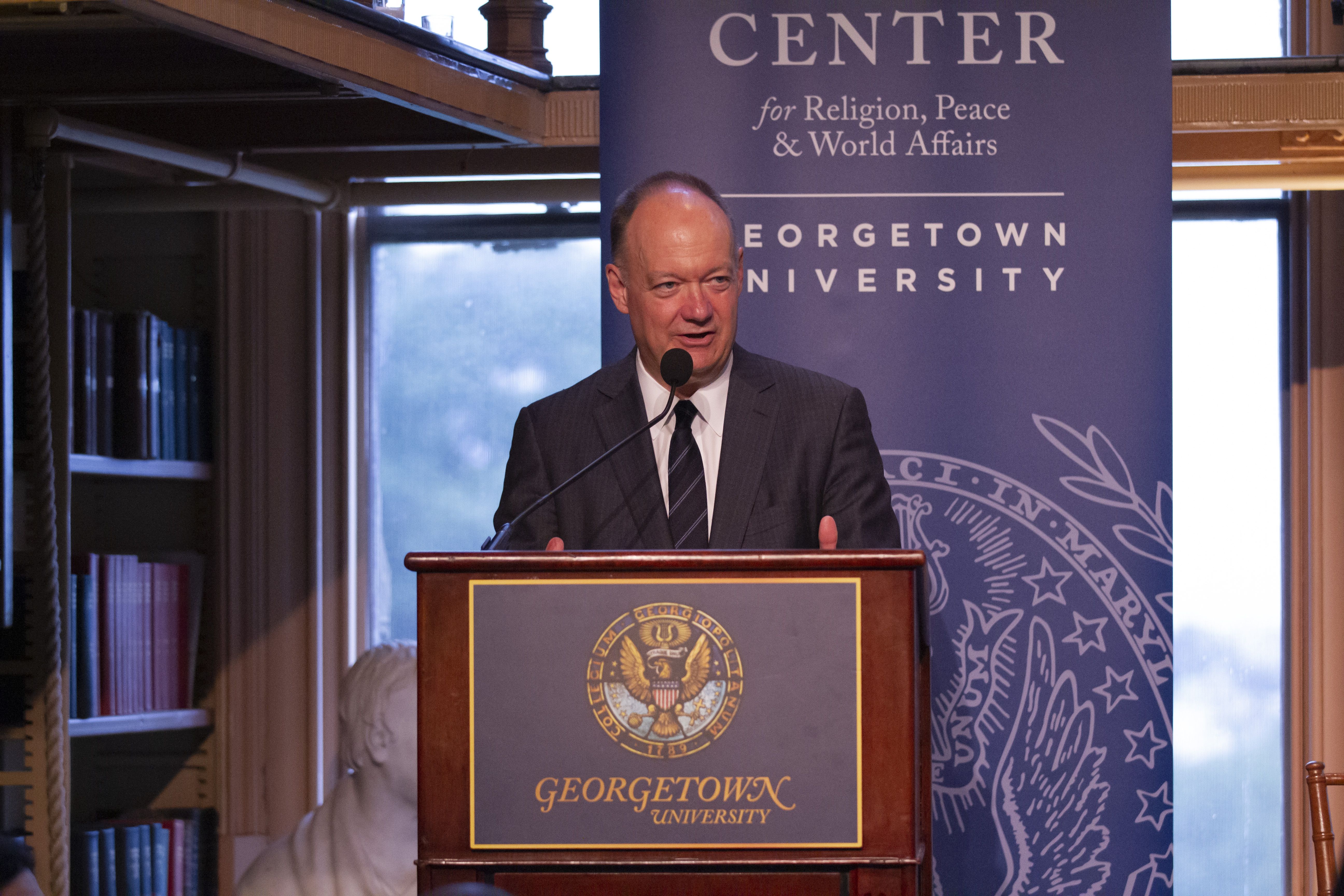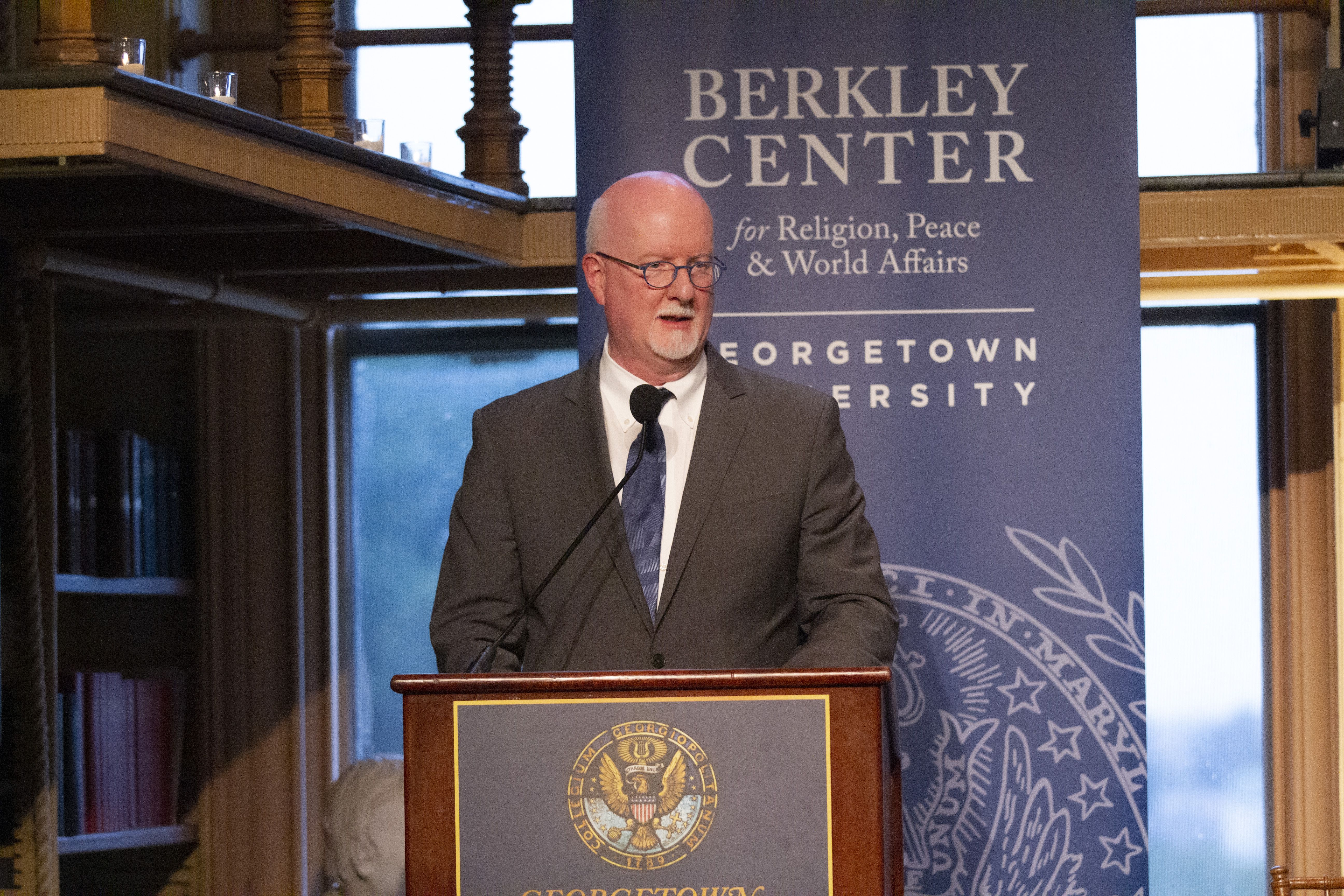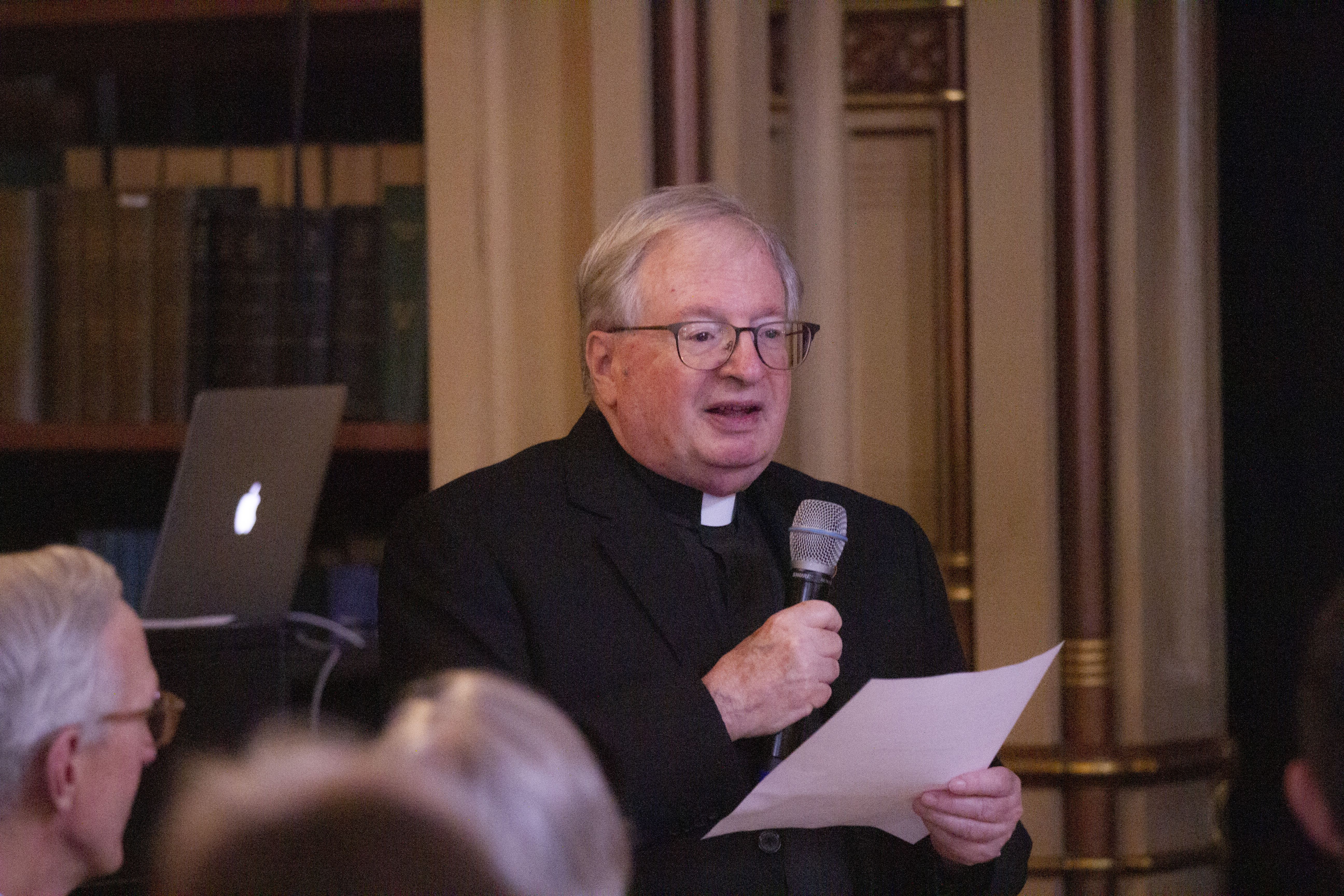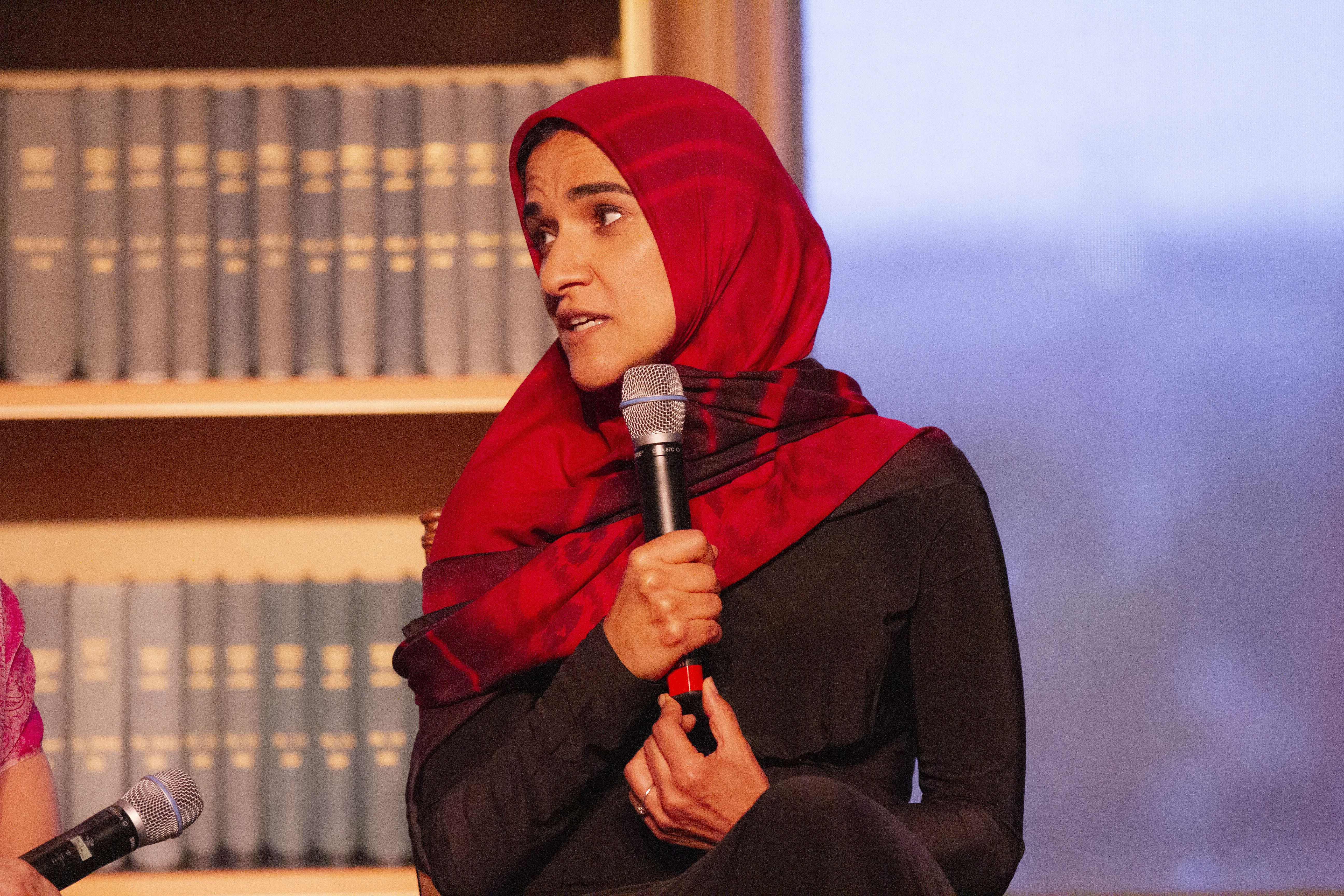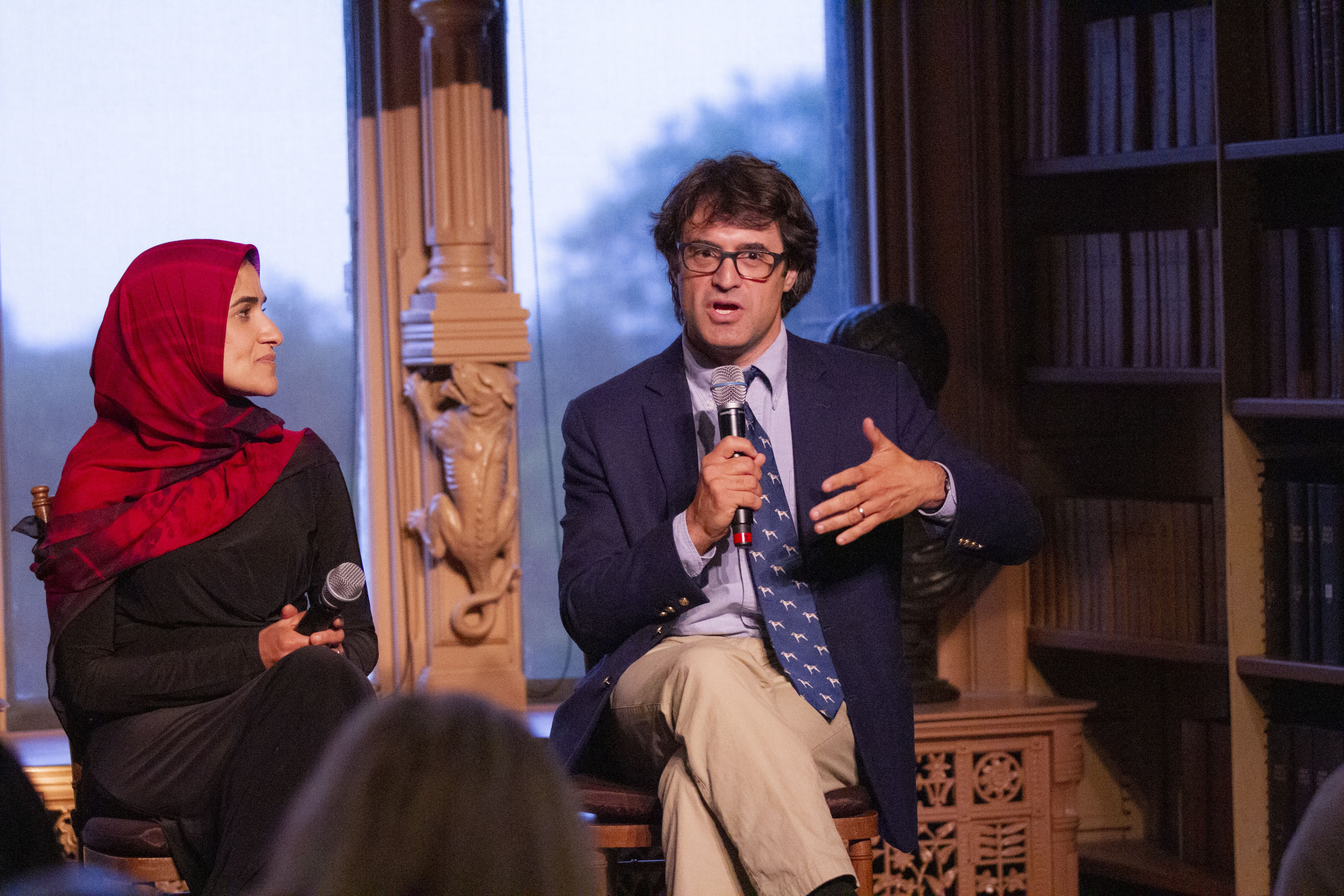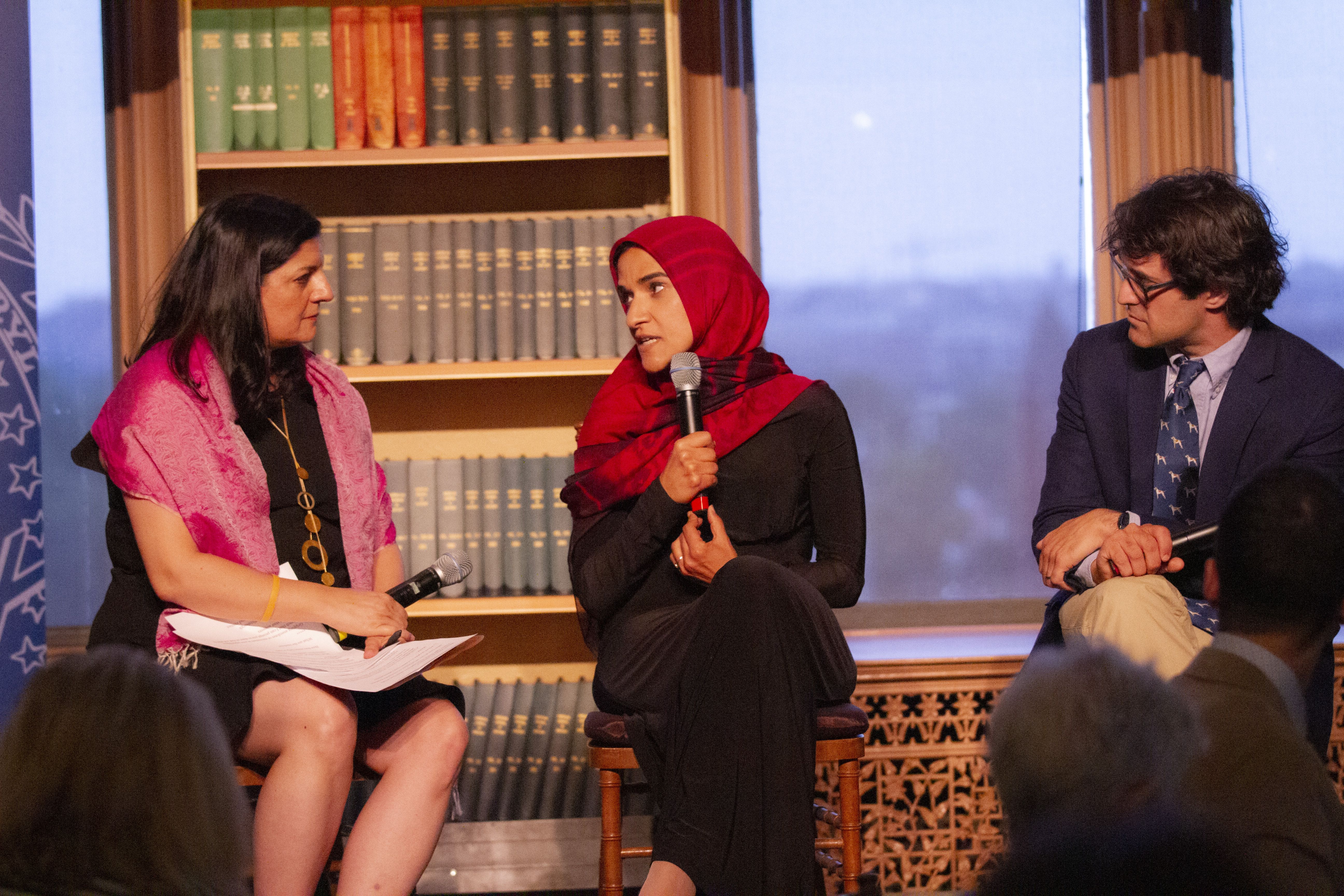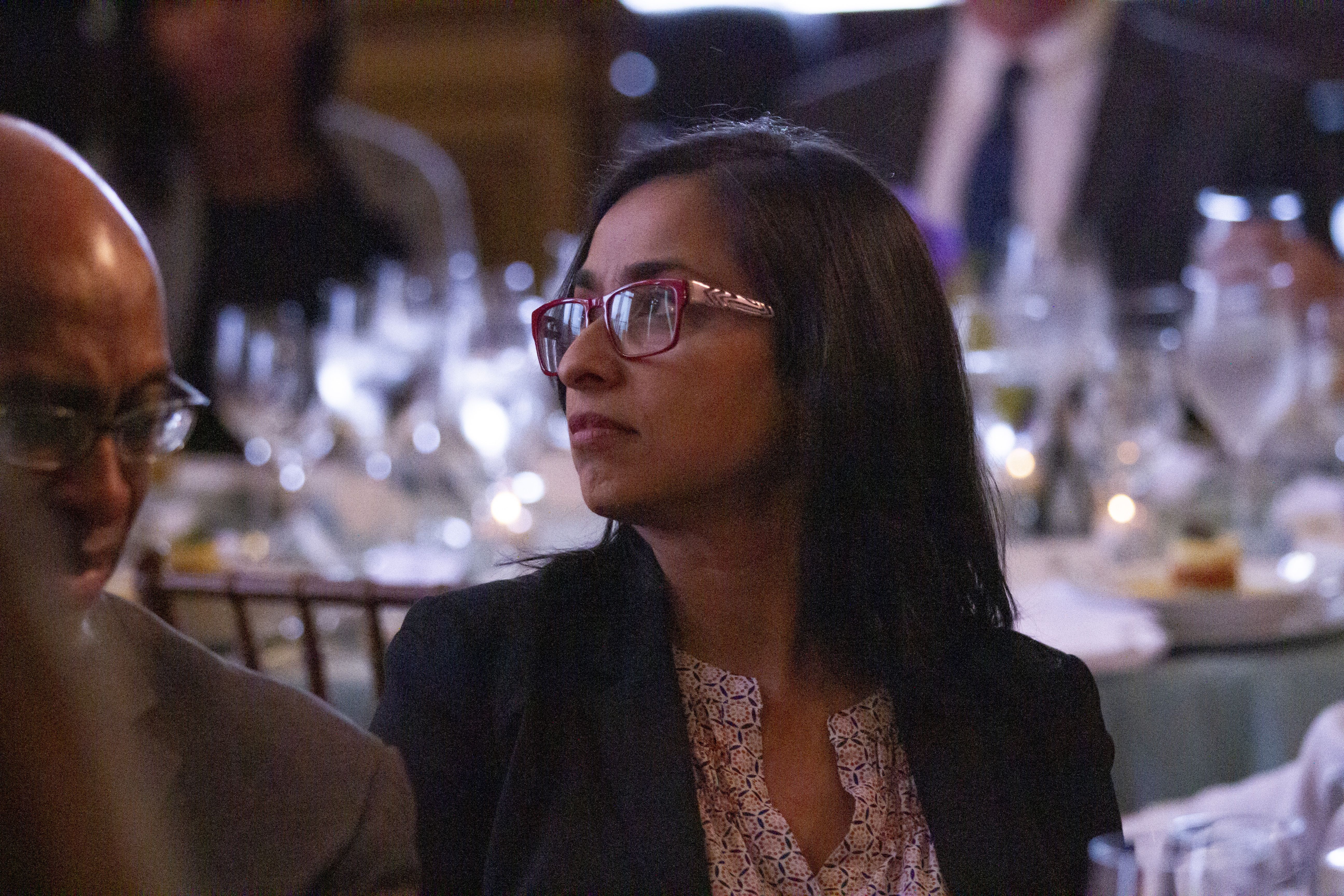“People with deeper devotion to their faiths actually have more tolerance for people of other faiths,” said Dalia Mogahed, director of research at the Institute for Social Policy and Understanding (ISPU) on Friday, June 7, 2019, during a dinner and panel conersation at Georgetown’s Riggs Library celebrating the partnership between the Pulitzer Center and the Berkley Center for Religion, Peace, and World Affairs.
Georgetown hosted the dinner in support of the Pulitzer Center’s Beyond Religion Conference, held over the next two days at the National Press Club in Washington, D.C. A moderated conversation at the Friday dinner focused on the role of religion and resilience in responding to community crises, in particular after the shooting at the Tree of Life synagogue in Pittsburgh.
Journalists, theologians, and scholars, some of whom spoke at the Beyond Religion Conference, gathered in small groups around five tables in the historic Riggs Library at Georgetown. As attendees settled into their seats, Georgetown University President John DeGioia spoke about the meaning of the partnership between the Berkley Center and the Pulitzer Center. “The resources [of the Pulitzer Center and the Berkley Center] provide the opportunity for students and scholars to engage in the role of religion in all its complexity.”
DeGioia continued: "It’s especially meaningful to come together in this space to reflect on the work and resilience of the Pittsburgh and Jewish communities in the wake of last year’s shooting at the Tree of Life congregation."
Next, Father Drew Christiansen, professor of ethics and human development at Georgetown’s School of Foreign Service, delivered a short prayer for the safety of the journalists around the world working toward uncovering truth.
Shortly after, Berkley Center Director Shaun Casey and Jon Sawyer, executive director of the Pulitzer Center, further delved into the partnership's significance.
Casey spoke of the indelible impact of the Pulitzer Center on Georgetown students. Georgetown's first Pulitzer Center Student Fellow, Julia Friedmann, “converted to journalism as a result of the fellowship,” he said. Friedmann's project for the Pulitzer Center examined the role of faith in peace and reconciliation in Colombia.
Sawyer then introduced the topic for the evening's conversation. The idea for the panel originated from an email exchange with Mark Oppenheimer, coordinator of the Yale Journalism Initiative and former "Beliefs" columnist for The New York Times, who was seeking funding for a book he was writing on the five generations of his family living in Pittsburgh’s Squirrel Hill community.
When he received this email, Sawyer thought of Indira Lakshmanan, executive editor of the Pulitzer Center, who grew up in Squirrel Hill. Mogahed, who has Pittsburgh roots, also fit naturally into the questions Sawyer hoped the panel could explore with Oppenheimer.
During the panel, Mogahed and Oppenheimer discussed the implications of the Tree of Life shooting on Jewish and Muslim communities in America, interfaith dialogue, and the ethics of reporting on gun violence.
Lakshmanan moderated the conversation, drawing on her own upbringing in Squirrel Hill. She lived three blocks away from the Tree of Life synagogue. As a non-Jew in the Jewish community, she remembers feeling welcomed.
Oppenheimer expanded on his relationship to the Squirrel Hill community. Although he grew up in western Massachusetts, his father is from Pittsburgh, and the community has always felt close to him. He visited a few times over his life, he said, but now he has been to Squirrel Hill about 25 times since the Tree of Life shooting.
“It’s a walkable urban neighborhood with a vibrant commercial center that people feel safe going to. It has a church, synagogues that are sites of religious conversations, a post office, a library, a major public high school, a fire station...all within a square quarter mile,” he said. While other suburban communities like Newtown and Columbine are more “geographically dispersed,” the sense of physical closeness in Squirrel Hill “has not been fractured,” he said.
Lakshmanan echoed Oppenheimer’s sentiment about the closeness within Pittsburgh communities. When she moved her mother out of Pittsburgh, she recalls visiting the locksmith, the bank teller, and the baker next door, and her mother knew them by name. This kind of closeness, she said, might go hand in hand with resilience in communities.
Mogahed’s connection to Pittsburgh took root when she and her family moved from Cincinnati for her to start graduate school at the University of Pittsburgh. They were driving when Mogahed looked up and saw “the biggest tragedy unfolding”: 9/11. She feared the backlash of the tragedy for someone “who looked like me, who was so visibly Muslim.” For the first time, she said, “I didn’t want anyone to know I was Muslim.”
As they drove, they did not stop once but to get gas. “I remember sliding down in the car,” she said, so no one would see her. Their first Friday in Pittsburgh, they did not know whether or not to visit the mosque. She and her family first decided not to go, fearing they would be targets of people's anger.
“Then we decided, no, this is our home, and whatever happens, we’re going to continue to live life as Americans, and we will not allow extremists from any background to dictate to us what that means.”
They drove to the Islamic Center of Pittsburgh, and Mogahed was surprised to see that half the congregation were people of other faiths who had come to show support and solidarity with the Muslim community. Oppenheimer said that interfaith community building carries over to the Jewish communities he has known.
Lakshmanan asked the panelists about the intersection of politics and interfaith dialogue. Oppenheimer explained after the Tree of Life shooting, President Trump had visited Pittsburgh and the rabbi of the synagogue had welcomed him. “[Many thought] the worst thing to do was politicize this, that those in grief needed the space to bury their dead and mourn,” Oppenheimer said.
Lakshmanan also inquired about the commonalities between the experiences of Jewish and Muslim communities. “One of the strongest predictors of Islamaphobia is anti-semitism,” Mogahed said, citing an ISPU study.
In the wake of the Tree of Life shooting, Mogahed said, Muslim communities “led the charge of reaching out” to Jewish communities in Pittsburgh. “A lot of people are feeling like they’ve never felt this vulnerable...there’s this common cause that’s felt,” she said.
During the question and answer portion of the panel, Pulitzer Center grantee journalist Ben Taub asked about the most egregious journalistic missteps in the aftermath of the attack, and whether these mistakes were similar or different to those in the coverage of other attacks.
Oppenheimer mentioned a journalist who kept repeating the killer’s name, which spurred a conversation between Mogahed and Oppenheimer on the ethics of reporting about the identities of shooters.
“The idea of not saying [the shooter’s] name is a great practice, but we don’t apply it to everyone. Certain names do get repeated very often,” Mogahed said. One practice Mogahed takes issue with is the humanizing story of the shooter. We see this more when the shooter is white, rather than of any other background, she said.
The practice of avoiding humanizing stories of the shooter in journalism is something that newspapers and magazines are now aware of, Lakshmanan noted.
Oppenheimer felt that the idea that journalists should not inquire about the stories of shooters was troubling. “It comes in conflict with what I think is part of my job—to understand people, and why people would give into this evil, radical inclination.”
Mogahed said that the problem she sees in reportage is the framing: “Certain criminals are seen as aberrations, where we want to understand what went wrong, but with other criminals, we don’t need to hear anything more than their name, and we already know their story. They're considered an example of what you would expect from their background,” she said.
“It’s the double standard I’m struggling with, the way we frame crime in one community as a glitch, and in another as a feature.”
Over the next two days, many of the journalists and attendees at the dinner hosted by Georgetown also joined in the Pulitzer Center's Beyond Religion Conference to continue these discussions on the ethics of reporting on tragedy, interwoven with questions of religion, gender, and more. Georgetown and its Berkley Center for Religion, Peace, and World Affairs are part of the Pulitzer Center's Campus Consortium network.
